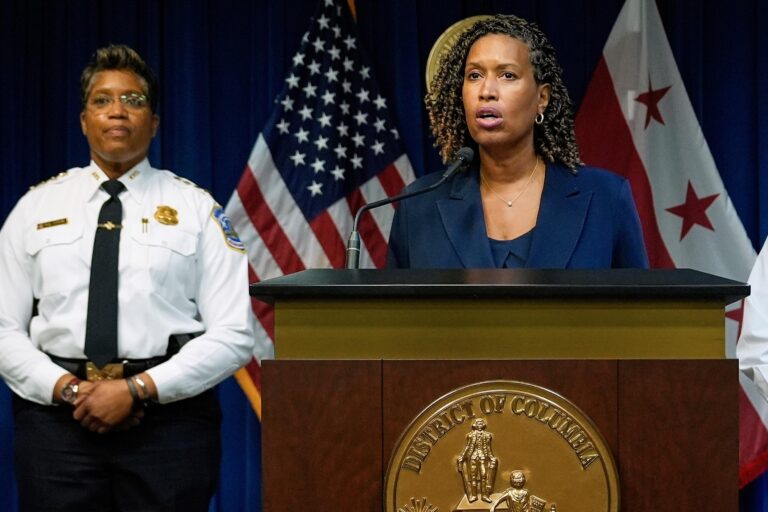Federal Oversight of Washington, D.C. Police: A New Chapter in Security and Governance
Trump’s Federal Intervention in DC Policing Amid Rising Tensions
In an unprecedented move that has ignited national debate, former President Donald Trump has placed the Washington, D.C. Metropolitan Police Department under federal jurisdiction and authorized the National Guard’s deployment to the capital. This decision, announced by the White House, responds to escalating unrest and security challenges within the city. It represents a marked increase in federal involvement in local law enforcement operations, prompting discussions about the future of governance and public safety in the District of Columbia.
- Federal Command Authority: Federal officials now oversee strategic and operational control of the DC police force.
- National Guard Activation: Troops mobilized to reinforce law enforcement and provide rapid response capabilities.
- Heightened Security Protocols: Implementation of expanded patrols, curfews, and security checkpoints across the city.
| Measure | Purpose | Anticipated Outcome |
|---|---|---|
| Federal Police Oversight | Centralized command structure | Improved coordination and decision-making |
| National Guard Deployment | Augment security forces | Enhanced rapid response and deterrence |
| Enforced Curfews | Minimize nighttime disturbances | Lower incidence of after-dark unrest |
Authorities emphasize that these steps are critical to de-escalating violence and protecting residents and property. The collaboration between federal agents and local police aims to create a unified front against disorder, with officials prepared to adjust tactics as conditions evolve.
National Guard Deployment: Strengthening Security and Stabilizing the Capital
To address the surge in protests and civil disturbances, federal authorities have taken the extraordinary step of assuming control over the DC Metropolitan Police Department. This move is designed to streamline command and enhance the city’s capacity to manage public safety challenges. The National Guard’s presence adds vital manpower and logistical support, focusing on safeguarding key government buildings and critical infrastructure.
Additional security initiatives accompanying the Guard’s deployment include:
- Creation of Integrated Command Centers: Facilitating seamless communication between federal and local law enforcement agencies.
- Targeted Patrols: Concentrated efforts in neighborhoods identified as potential hotspots for unrest.
- Strict Enforcement of Curfews: Nightly restrictions from 9 PM to 5 AM to curb disturbances.
- Rapid Response Units: Specialized teams ready to address emergencies swiftly and effectively.
| Security Strategy | Goal | Implementation Timeline |
|---|---|---|
| Federal Police Command | Unify operational control | Immediate effect |
| National Guard Support | Bolster law enforcement presence | Ongoing deployment |
| Curfew Enforcement | Reduce nighttime incidents | 9 PM to 5 AM daily |
Consequences for Local Autonomy and Civil Rights Amid Federal Takeover
The federal assumption of control over the DC police force signifies a profound shift in the power dynamics between local and national authorities. Washington, D.C., which traditionally exercises home rule over its policing, now faces a temporary suspension of local governance in favor of federal oversight. This raises important questions about democratic accountability and the potential precedent it sets for federal intervention in other municipalities.
From a civil liberties standpoint, the increased presence of federal and National Guard forces introduces concerns about the protection of constitutional rights. Critics warn that the militarization of law enforcement could suppress peaceful protests and escalate tensions rather than alleviate them. The delicate balance between ensuring public safety and safeguarding freedoms such as assembly and speech is under intense scrutiny.
- Reduction in Local Control: Federal authority supersedes local decision-making, limiting community influence.
- Risk to Civil Liberties: Potential for excessive force and restrictions on lawful demonstrations.
- Jurisdictional Challenges: Ambiguities in legal authority may complicate accountability and oversight.
| Area of Concern | Possible Impact |
|---|---|
| Governance | Local autonomy curtailed by federal intervention |
| Public Confidence | Potential erosion if enforcement is perceived as heavy-handed |
| Civil Rights | Heightened risk of infringement during law enforcement actions |
| Legal Clarity | Unclear boundaries of authority may hinder accountability |
Balancing Security and Rights: Expert Calls for Transparent Protocols
Security analysts and civil rights advocates alike stress the necessity of clear, transparent guidelines to govern federal involvement in local policing. Without well-defined protocols, the risk of power abuses and community alienation increases, potentially undermining the very stability these measures seek to achieve. Experts advocate for robust accountability frameworks to ensure that military and federal law enforcement actions respect constitutional protections.
Recommended strategies include:
- Defined Command Structure: Clear identification of leadership and responsibility during federal interventions.
- Community Collaboration: Active engagement with local leaders to address concerns and build trust.
- Explicit Use-of-Force Policies: Detailed standards to minimize harm and prevent excessive measures.
- Transparency Measures: Use of body cameras and public reporting to maintain oversight and public confidence.
| Issue | Expert Recommendations |
|---|---|
| Risk of Civil Rights Violations | Establish independent oversight panels with diverse community representation |
| Unclear Operational Authority | Implement a transparent chain of command and communication protocols |
| Distrust Between Residents and Law Enforcement | Conduct regular public briefings and foster open dialogue forums |
Conclusion: Navigating the Complexities of Federal Intervention in DC
The federal government’s decision to assume control over the Washington, D.C. police and deploy the National Guard underscores the seriousness of recent disturbances and the urgent need for stability in the capital. While these measures aim to restore order, they also bring to light critical challenges related to governance, civil liberties, and community trust. As the situation continues to develop, ongoing vigilance, transparent communication, and balanced policies will be essential to ensure both security and democratic principles are upheld.







